
It nearly didn’t happen…
A first-ballot Hall of Famer, Alysheba earned more $6.6 million during his illustrious racing career. The three-time champion came to hand for legendary horseman Jack Van Berg during his 3-year-old season, recording his first official stakes victory in the 1987 Kentucky Derby (G1).
It nearly didn’t happen when eventual runner-up Bet Twice crossed over into his path, forcing Alysheba to stumble in upper stretch at Churchill Downs.
Pat Day, Bill Shoemaker, Randy Romero, Don Brumfield…
Notable jockeys took turns early in his career, with Pat Day, Bill Shoemaker, Randy Romero and Don Brumfield riding Alysheba during his 1986 juvenile campaign.
The bay son of leading sire Alydar showed class recording four stakes placings, including a third in the Breeders’ Cup Juvenile (G1), but Alysheba’s lone win came in a Turfway Park maiden special weight event in mid-September.
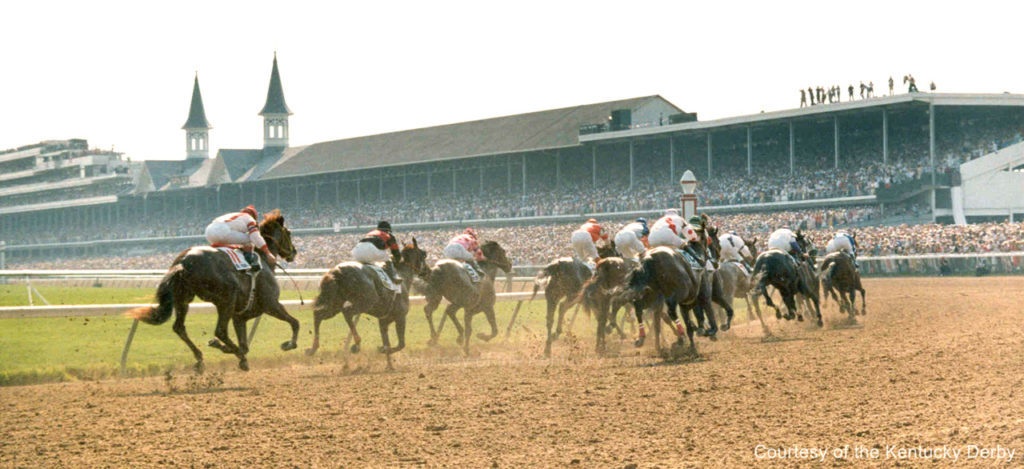
Enter Chris McCarron
“I happened to be walking through the barn area at Santa Anita and Jack (Van Berg) rode up alongside of me and said, ‘When do you start back up riding?’
Jockey Chris McCarron
Alysheba’s 3-year-old season began in disappointing fashion, lodging a well-beaten fourth as the odds-on favorite in an entry-level allowance at Santa Anita, and following another setback in the San Felipe (G1), Alysheba was diagnosed with an entrapped epiglottis. He underwent minor throat surgery to correct it in late March, necessitating a one-month absence from the races, and during the interim Van Berg approached Chris McCarron about taking over the mount.
One of the nation’s top riders since the mid-70s, McCarron was returning from a devastating injury at the time, breaking his leg in five places during a spill at Santa Anita in October 1986.
He took the call for Alysheba’s first start back in the April 23 Blue Grass (G1) at Keeneland, and as Rick Blaine said in the movie Casablanca, it was the beginning of a beautiful friendship.
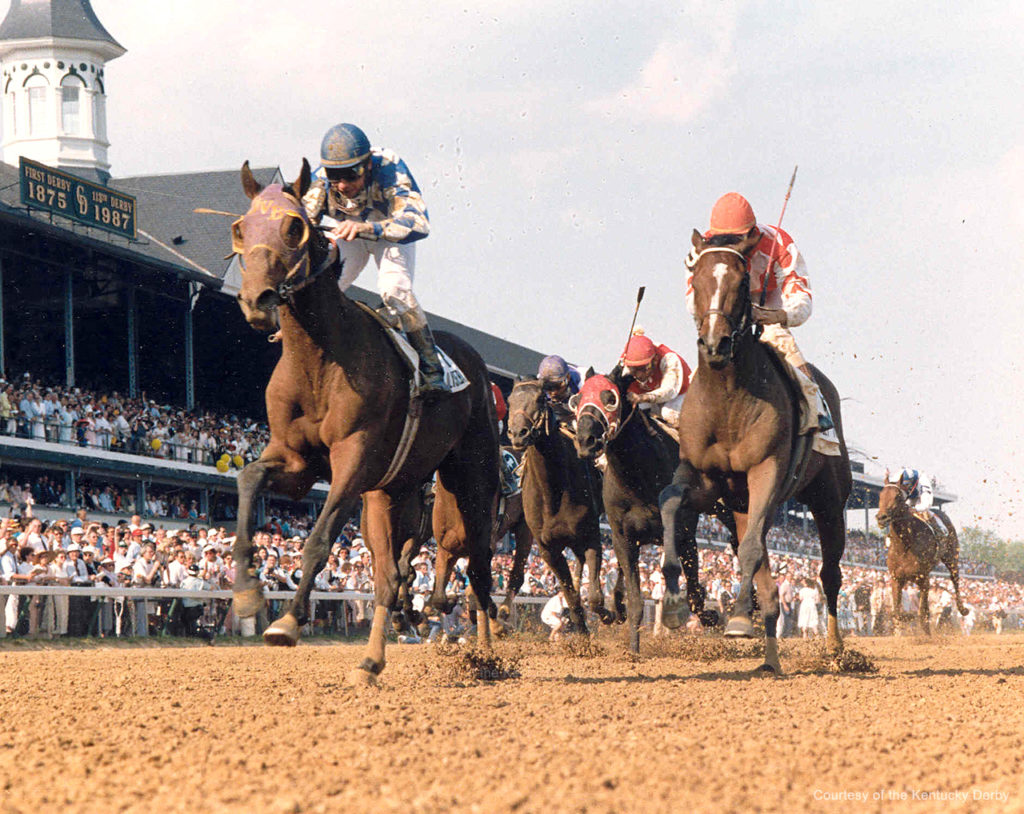
McCarron, who had thrice led North American riders by wins (1974, 1975, and 1980) and earnings (1980, 1981, and 1984), was hungry for his first Kentucky Derby success after finishing twice previously aboard Desert Wine (1983) and Bold Arrangement (1986). Alysheba came along at the right time in his distinguished career, and McCarron recalled the fortuitous turn of events that landed him the mount.
“It was early April, I was just making a comeback after being off for six months with a broken left leg,” said McCarron, who retired in 2002 and ranks sixth all-time among North American jockeys with 7,141 wins. “I happened to be walking through the barn area at Santa Anita and Jack (Van Berg) rode up alongside of me and said, ‘When do you start back up riding?’ I said, ‘This coming weekend,’ and he said, ‘Good, I want you to ride this colt,’ and he was leading Alysheba.
“I said, ‘Oh my God, I’d love to.’ Pat Day (who had been riding Alysheba) had committed to Demons Begone (for the Kentucky Derby), and Alysheba had a good record already. So I got to breeze him a couple of times (in California), and then Jack shipped him to Keeneland.”
Failed to draw…
Since graded earnings, the criteria at the time for making a 20-horse Kentucky Derby field, weren’t an issue, Van Berg planned to run Alysheba in a Keeneland allowance because he was concerned about fitness following the surgery. The conditioner altered paths to the Blue Grass when the scheduled allowance failed to draw enough runners.
Alysheba showed no signs of rust launching a bold rally in the 1 1/8-mile Blue Grass, but jumped tire tracks from the starting gate in the stretch (sixteenth of a mile from the finish) and suddenly ducked out into a rival. After reaching the wire first by a head, he was disqualified by stewards.
”He ran a great race, got to the wire first, and if wasn’t for jumping the tracks, he’s going to win outright,” McCarron said. “It was a bit of bad luck there, but it indicated to us he was for real.”
The great race
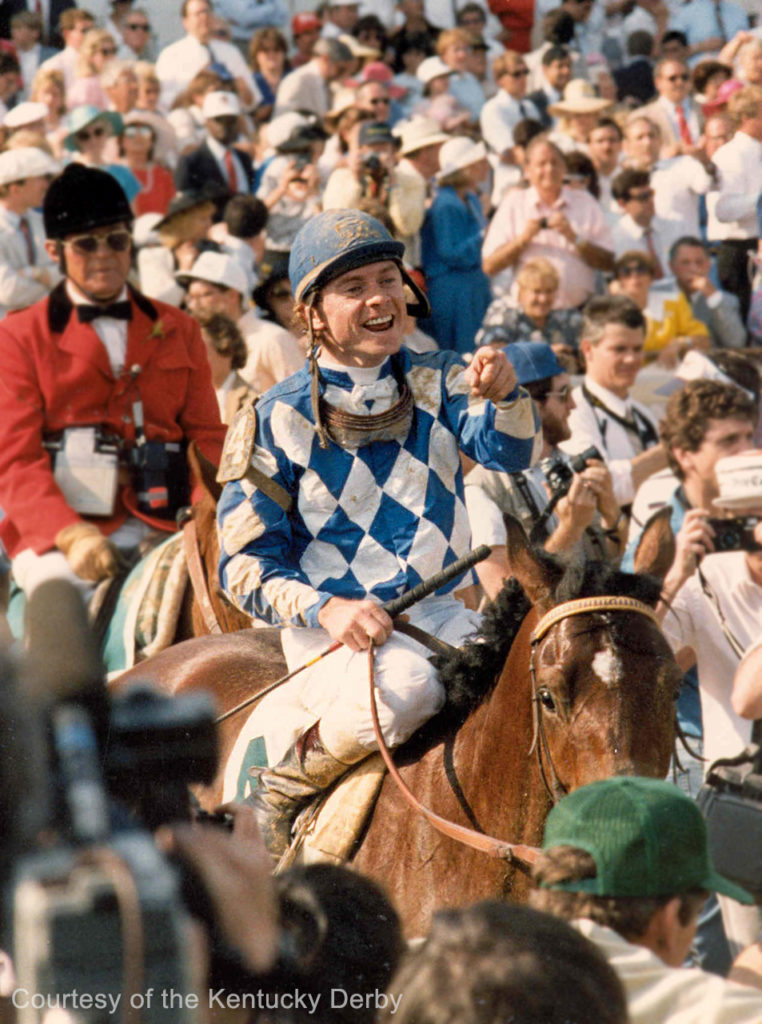
Officially, Alysheba was still eligible for an entry-level allowance, bringing a 1-for-10 career record to the Kentucky Derby post parade, and bettors dismissed him as the 8.40-1 fifth choice among 12 wagering interests in a 17-horse field that included a pair of coupled entries and a mutuel grouping.
Breaking from post 3, Alysheba rated more than a dozen lengths off the pace towards the back of the pack, 13th entering the backstretch at Churchill Downs.
After being angled outside to avoid traffic, he began to rapidly pick off foes, closing powerfully into contention on the far turn, and arrived at the top of the stretch in position to pounce upon the lone remaining opponent, Bet Twice.
After straightening for home, Bet Twice was up by about a length when Craig Perret went to the left-handed whip. Bet Twice immediately drifts into Alysheba’s path, making contact with his legs.
“With all the adrenaline pumping and knowing I only had one horse to beat to get the Roses, I was pretty confident up to when Bet Twice ducked out in front of us,” McCarron said. “When Alysheba clipped his heels, there was so much adrenaline going on, I didn’t really think, ‘Don’t fall,’ I was thinking, ‘Let’s go, we only have one horse, let’s get by (Bet Twice).’ Fortunately, Alysheba was a very strong individual. He was able to overcome that mishap and show what a champion does.”
Many observers missed the incident in upper stretch. Even at regular speed on replay, it is difficult to discern more than a slight stumble. The slow-motion replay illustrates how a perilous situation was avoided, with Alysheba quickly regaining his balance after being interfered with by Bet Twice.
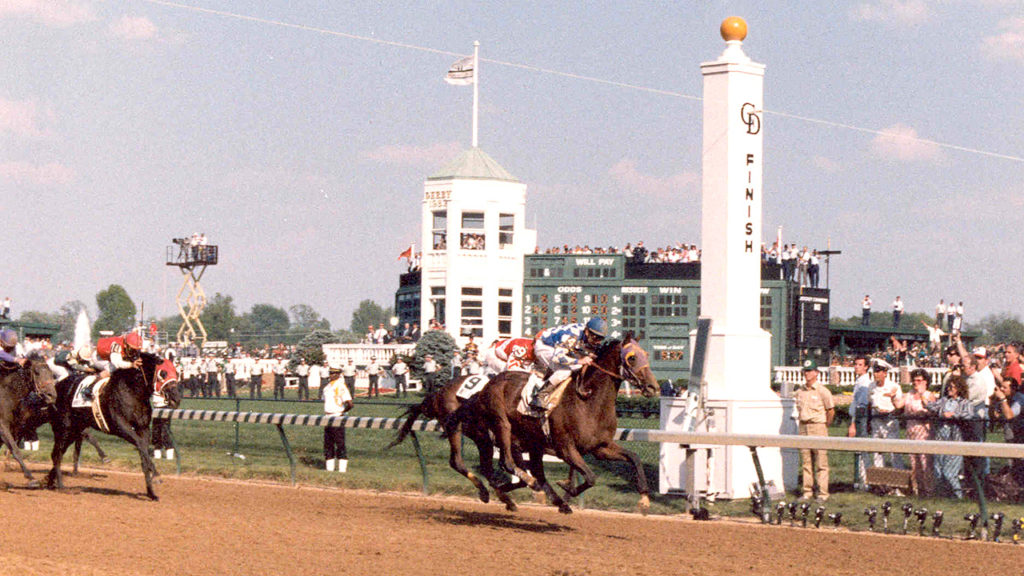
“It was an amazing race, when you see a horse stumble like that you often think they’ve lost all chance, but he just recovered so quickly and got back on stride,” said retired track announcer Mike Battaglia, who called the 1987 Derby for the on-track audience under the Twin Spires. “I think it made him mad.”
Bet Twice edged away after the incident, drifted out again in midstretch, but Alysheba would not be denied in the 1 1/4-mile classic. The muscular sophomore charged past to win by three-quarters of a length, the first of 10 stakes triumphs for the Dorothy and Pam Scharbauer-owned Thoroughbred.
“It would have been a nasty wreck if he had fallen at that point, and when you watch it at regular speed, it doesn’t look like that big a deal,” McCarron said. “On the slow-motion replay, you get to see how far down his head goes. When it happened, I didn’t realize how serious it was until I got to see the replay. Then, I was thanking my lucky stars he was able to show his athleticism. Alysheba showed what a terrific athlete he was.”
The Van Berg effect
The fifth Kentucky Derby winner bred by Preston Madden’s Hamburg Stud, Alysheba captured the Preakness (G1) at Pimlico two weeks later, but his Triple Crown pursuit came to an end with a fourth in the Belmont Stakes (G1).
He added the Super Derby (G1) to his resume before concluding his 3-year-old season with a nose second to Ferdinand in an epic edition of the Breeders’ Cup Classic (G1).
“Alysheba was a credit to Jack Van Berg, he took his time with the horse and was never one to rush them — he got the horse ready,” Battaglia explained. “(Alysheba) kept improving, and he was one of those horses who really got better with experience.”
After being named champion 3-year-old, Alysheba proved to a beast at age 4, winning 7-of-9 starts and Horse of the Year honors. He concluded his racing career with smashing win in the 1988 Breeders’ Cup Classic at Churchill Downs.
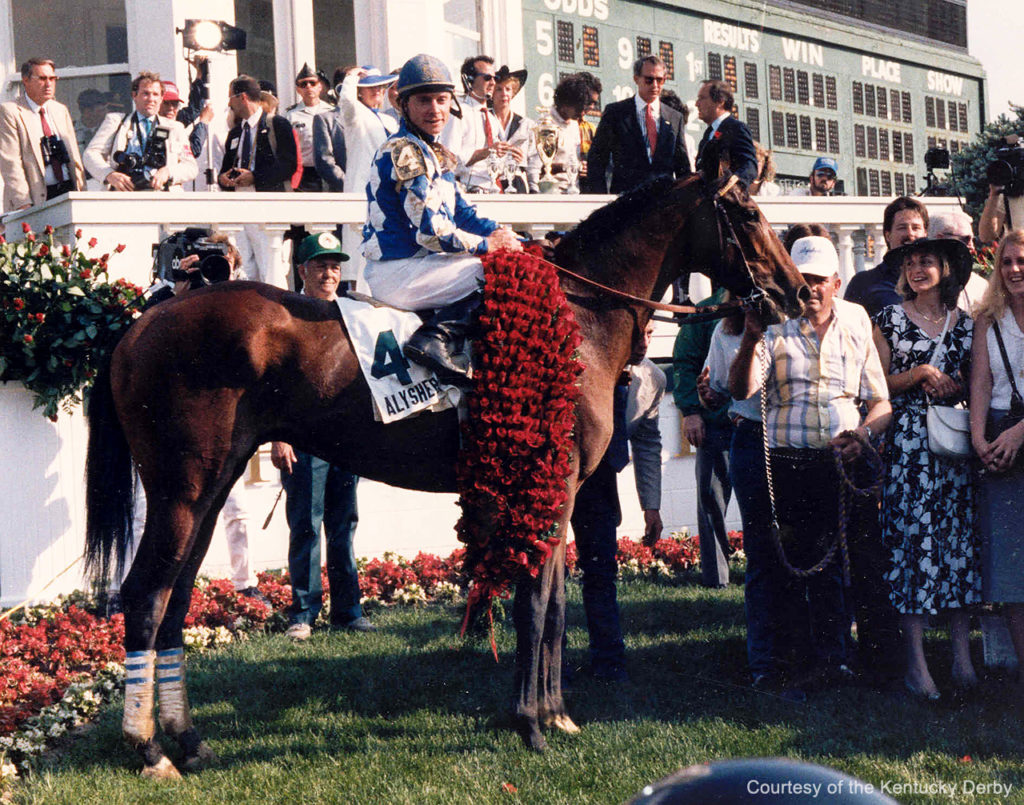
“Alysheba was better later in his career, his 3-year-old turned out to be very good but when he hit (age) 4, that’s when he really hit his stride,” Battaglia said.
McCarron, who was up for the final 17 starts, fondly remembers how important Alysheba was to him personally, and to the horse’s adoring fans.
“He meant the world to me, during that stage of my career, and he became a very popular horse around the country. So much so, that after he won the (Breeders’ Cup) Classic and we got back to the winner’s circle, there was a group of people in the stands behind it holding up a big sign that said, ‘Alysheba for President.’”


